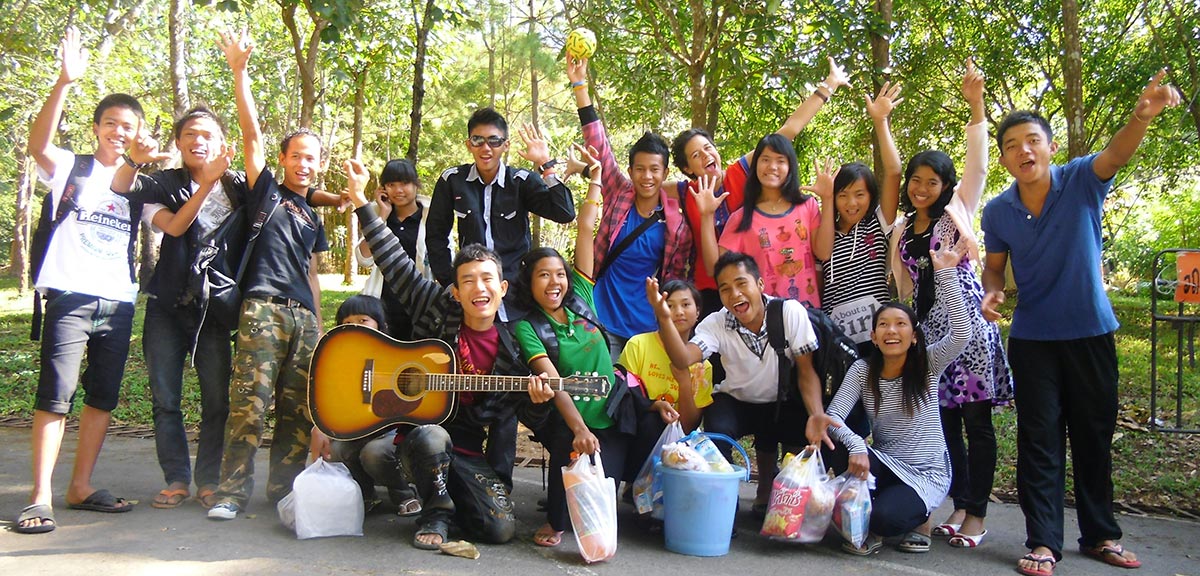Bishop’s and Champlain Students: Are you interested in doing international volunteer work?
Sometimes life gives you an amazing opportunity for a deep and rich experience. Take a chance!
Apply NOW for the Mae Sot Education Project
A volunteer opportunity for Bishop’s & Champlain students, working with Burmese refugee and migrant kids in Thailand – Application deadline: November 1st, 2018. For application information see: Angie Petitclerc (BU Writing Centre) or Randi Heatherington (CRC 223).
Information sessions for students considering application to volunteer: Wed., Sept. 26th (7:00pm location to be announced) and Thurs., Sept. 27th (12:30pm in CRC 343) on campus.
Volunteers share their first impressions of their Mae Sot Experience
First Morning at BHSOH
By Fidélie Camirand, 2018 Volunteer
Monday, June 11th, 2018
As this is my first full day at BHSOH, the Burmese learning center where I will work full-time for the next six months, I am not giving lessons today. I asked for a short period of observation to attend classes and take notes. The first I am invited to join is a grade 10 class given by a volunteer teacher from Hong Kong. He seems to be very confident and organized which is a bit intimidating to me. I don’t think I’ll ever look this confident, and especially not tomorrow, when I will give my first class. The students listen quietly to his instructions. I hope they will listen to me when my turn comes.
For this lesson, the students have to compose sentences with two clauses. After taking a little time to write their sentences, some are invited to the board. They look shy and nervous, but they keep smiling nevertheless. The second student to come to the board writes the following: “He is poor but he is kind.” My heart stops. I am completely moved. The volunteer says that the sentence is correct, and the student sits back in his chair as if nothing has happened. A girl is invited to the board next. She does not seem comfortable. She fidgets in the front for long seconds. I would like to help her. You can do it! I try to tell her with my eyes. She hesitates some more before taking the board marker and nervously writing the following under her classmate’s sentence: “She is poor but she is cleaver.” My heart skips another beat, and I smile as my eyes tear up. How am I ever going to do this? I think, as I find myself unable to spend thirty minutes in the classroom without crying.
The volunteer asks the class to correct the mistake. The students identify it, and the volunteer explains that a cleaver is a large knife which results in a peal of giggles. The girl erases the end of her sentence and writes “clever”. As she quietly returns to her seat, I read the words on the board again. “She is poor but she is clever.” She most definitely is very clever. I know they all are, and in this moment I feel so humbled to be there, surrounded by students with such intelligence and strength. What an amazing opportunity for a fruitful exchange. I really hope I will live up to my new role among these young people and their community.
Walking by the headmaster’s office before going for lunch, I notice a drawing on the wall which I recognize as the General Aung San, a Burmese hero. Beneath the image can be read the following: “Improvement start with I.” So does incompetence, I think to myself with a bitter grin. Chasing the unwelcome thought, I stare back at the beautifully handwritten words. This morning is definitely filled with meaningful sentences. “Improvement start with I.” I feel that I would like to put a “s” and correct the pronoun up there at some point, but for now, I will try to stand by this motto. As I allow myself to make inevitable mistakes, my will to improve has to guide my work here, and I know that, day by day, I will learn to help the students a little better and a little more than I could the day before.
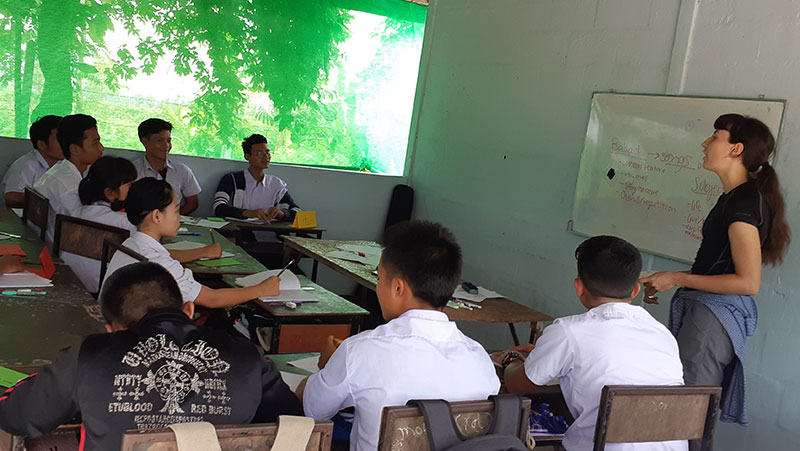
Fidélie taking her turn in the classroom
You know more than you think
By Fanny Barret, 2018 Volunteer
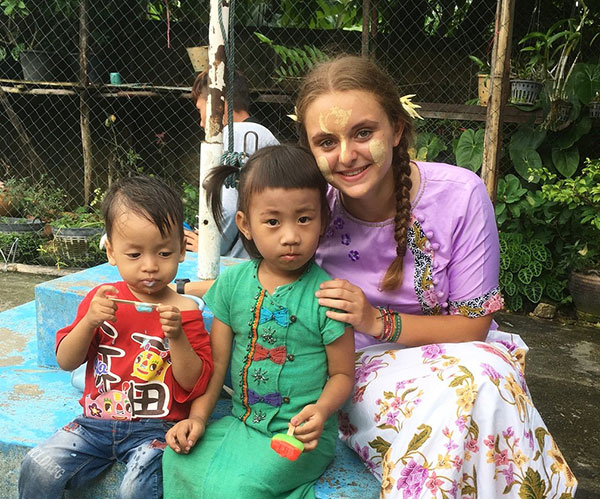 From the moment I was accepted into the project to my first week in Mae Sot, my biggest fear was always the same. It wasn’t leaving my home, my friends, my family. I had done that before. It wasn’t living in a different country with new languages, foods and habits. I had done that before. But I had never had to take responsibility for student learning. Up until a few months ago, I was the one being educated, and now I was in charge of students’ education? This was terrifying to me. Despite the months of TESL preparation and the many reassuring words of past volunteers, I never stopped doubting myself. I am not talking about crippling anxiety that froze me to the ground and made me wish I hadn’t taken part in this project. I am simply talking about this little voice in my head that kept saying, “Do you really belong here? You were just a student, what do you know about being a ‘teacher’?”
From the moment I was accepted into the project to my first week in Mae Sot, my biggest fear was always the same. It wasn’t leaving my home, my friends, my family. I had done that before. It wasn’t living in a different country with new languages, foods and habits. I had done that before. But I had never had to take responsibility for student learning. Up until a few months ago, I was the one being educated, and now I was in charge of students’ education? This was terrifying to me. Despite the months of TESL preparation and the many reassuring words of past volunteers, I never stopped doubting myself. I am not talking about crippling anxiety that froze me to the ground and made me wish I hadn’t taken part in this project. I am simply talking about this little voice in my head that kept saying, “Do you really belong here? You were just a student, what do you know about being a ‘teacher’?”
Dear future volunteers, you know more than you think – precisely because you were just a student.
You and I have spent most of our lives in classrooms. We’ve had so many different teachers. Some amazing ones, some that touched our hearts forever, and maybe some that we wish we had never had. We learned from all of them. Now, in Mae Sot, when I have to stand up in front of a class, I am constantly reminded of all my teachers. Almost every day, I do something or say something and picture one of my teachers doing something similar, and then I know I am on the right path. It feels so natural because I have seen it all my life. Don’t underestimate observational learning. You will learn a lot in the six months before leaving for Mae Sot. You will have two amazing TESL teachers who will give you great tools. But don’t forget how much you learn just by watching.
This observational learning experience is particularly important because it applies to me directly, but it is also something I pass on to my students as well. Because I can see now how much I learned from my teachers just by being in the classroom with them, I know that I can help my own students learn now, even unconsciously. Helping students learn comes with more responsibility than I thought. I knew I would have to help them with their English, that I would have to plan lessons carefully and make sure that they learned some grammar and vocabulary, as well as speaking, reading, listening and writing skills. This is what we are trained to do. However, I underestimated how much my students could learn from me as a person, when I am just being myself, just being around them. This role is as important as helping them learn English. When I say that being in this position comes with great responsibility, don’t get me wrong: it is scary, but it is also an amazing, unique privilege.
Hidden riches – Discovering Mae Sot
By Poppy Webster, 2018 Volunteer
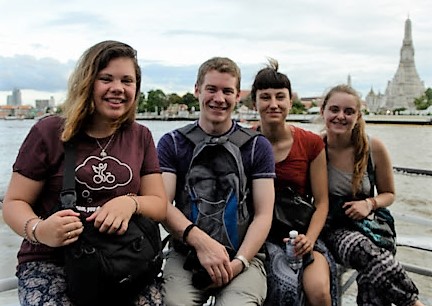
Poppy, Tyler, Fidélie and Fanny’s first day in Thailand!
I had anticipated seeing poverty in Thailand, and it is clearly very visible, but what surprised me both in Bangkok and Mae Sot are the riches. Whilst traveling along the well-trodden streets in Mae Sot, noticed houses with large gated entrances hidden away along each small lane. New coats of paint and golden statues of Buddha, elephants and many other symbols beckon the eye. These treasures are hidden from view, often constructed from wood, but in rarer cases you will find brick houses. Even the wood houses appear modern and well-kept and are raised high up from the ground to protect them from flooding.
Further along the journey, large billboards with advertising, including promotions for western products, become noticeable. Large concrete building blocks which appear to be newly constructed, overlook the city with their immense glass windows. However, one of the most surprising realisations is that along that same road, there are small, poorly constructed wood (sometimes bamboo or sheet metal) buildings which sit on floors with no foundations. They are surrounded by people and children looking out and watching the world go by, waving or playing with the dogs. It is clear, looking through the doorways of these homes, that these people don’t have many possessions.
The first Sunday we spent in Mae Sot, this contrast between affluence and poverty became even more apparent to us as we spent the morning exploring on our bikes, visiting the different schools at which we were going to volunteer. We witnessed the poverty experienced by these families in the rickety wooden houses. We saw the flooding in their homes due to the torrential rain from that day. That evening we went to eat in the big shopping centre located by the Asia Highway. It was very popular but when we looked at the clothes and the food and saw the prices, we noticed that they were a lot more expensive than prices in the town shops and at least double the prices of the Burmese market. Yet despite these high prices the shopping centre was full of people, shopping and dining at these pricey boutiques and restaurants.
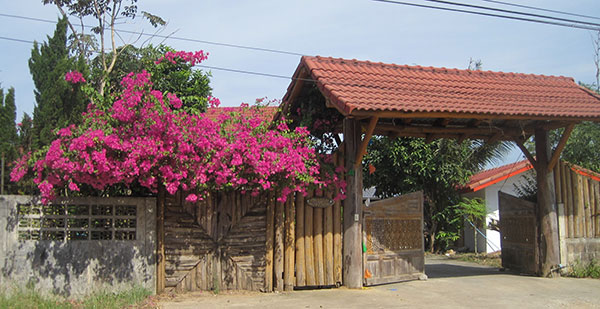
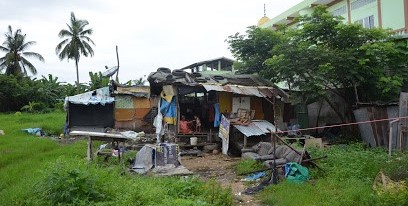
Contrasting images of Mae Sot
While many locals seem intrigued to see us four young westerners on our bikes, they always smile, a wide smile that makes us feel as warm as the sun. Their genuine smiles make us feel safe and welcome and we know that even if it’s pouring rain or boiling hot, it’s going to be a good day. This warm welcome is one of the greatest things here because despite issues of wealth and poverty, it makes us feel good and reminds us that life is good. After only three days in this amazing country, I feel that I have now found one of the best riches in the world.
So is it a con or is it a pro?
By Tyler Gordon, 2018 Volunteer
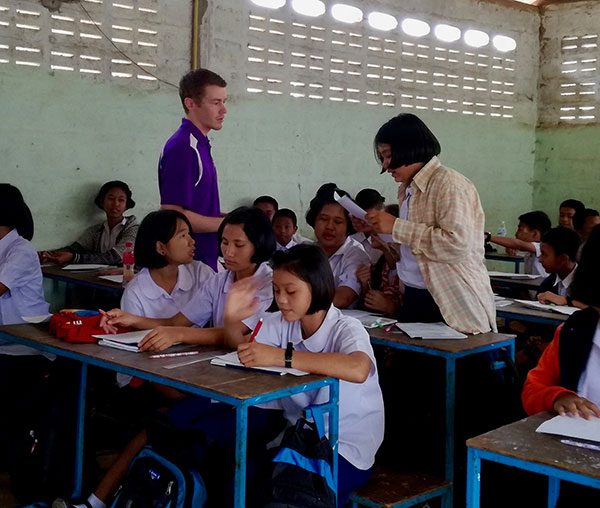
Tyler, listening and explaining to students
There are pros and cons to everything in life, from personal matters to our careers. Volunteering to help Burmese kids learn English for the Mae Sot Education Project is no different. I’m going to paint you a picture of a specific moment that I have experienced.
During my afternoon class with 53 students, my co-volunteer Fanny and I have just finished teaching a new grammar point. As we walk around the class helping the students who may not have understood it the first time, I realize there are two kinds of students who do not understand: those who need a simple one-on-one re-explanation and those who will need to have the point explained multiple times. The latter is the student who provides me with my “con”, or challenge. As I begin to re-explain the grammar point to this student, all seems to be going well, but then he says he does not understand, which is perfectly normal. So I find another way to explain it. As each explanation comes to an end, the student still does not understand. With each new version of the same explanation, I can feel my patience starting to run thin. I keep reminding myself that I have to remain calm and that it is normal he might be having difficulty. Finally, ten to fifteen minutes have passed, and I am now on explanation number eight. I am taking deep breaths to calm myself, and I can tell the student is getting frustrated too. The final solution is to get another student to explain, hoping that this will be the last and successful explanation. Unfortunately, it is not, and I am back to square one. Getting told by my fellow volunteer that we have to move on, I feel relieved but frustrated that I was not able to get through to my student. The student on the other hand looks relieved that I will not be continuing my explanation – which probably sounds like gibberish to her. This situation is a “con” for me because I should not be getting frustrated over a student who does not understand, no matter how long it takes to explain it.
Fortunately, these kinds of situations lead to my pro, the moments when, after explaining something five to six times, it finally clicks for the students. They understand what I was trying to teach them. My impatience and frustration simply disappear and are replaced with a feeling of accomplishment. I can see the excitement build in my students’ eyes as they finally understand. For me as a teacher, sharing in their excitement is one of the best feelings, and it makes me feel like I have succeeded.
The “con” may seem to be the focus here, but in reality it is not really a con at all. The feelings of accomplishment that arise from these challenging moments is the most rewarding. There will always be cons, but as a volunteer I find it important to remember the pros that usually follow close behind. They are moments that are likely to stay with me forever. The balance between cons and pros serves as a constant reminder as to why I chose to participate in the Mae Sot Education Project.
An Invitation
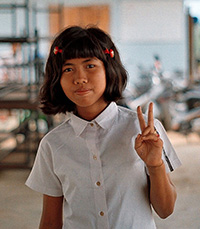 The Mae Sot Education Project invites all its donors and supporters to attend a “5 à 7”.
The Mae Sot Education Project invites all its donors and supporters to attend a “5 à 7”.
MSEP wishes to thank its community donors and supporters. Please join us in celebrating 15 years of working together. Bring friends! Meet our project committee and hear what some of our volunteers have to say about their experience with the project. Enjoy refreshments, good company and music at the beautiful Uplands Cultural & Heritage Centre in Lennoxville.
Date: Friday, October 12, 2018
Time: 5:00 p.m. to 7:00 p.m.
If possible, please RSVP at: 819-346-7278 or marypurkey@gmail.com.
Who we are and what we do
The Mae Sot Education Project (MSEP) is a community project based on the campus of Bishop’s University and Champlain College – Lennoxville in Sherbrooke, Quebec. Since 2004, we have provided assistance to six schools (officially called migrant learning centres or MLCs) for migrant and refugee youth from Burma/Myanmar whose access to education depends on support from the international community. In recent years we have also worked with other MLCs. Each year we select a group of young people from our campus to go to Mae Sot for six months. While there, they provide practical assistance to teachers and enrichment activities for children in the schools. They learn about the situation of displacement experienced by the Burmese people in Thailand as well as about the challenges for the Thai community in coping with a large population of refugees and migrants. Finally, they share their experience with Canadians. Over the last 14 years, MSEP has delivered over $126,000 in funding assistance (excluding two substantial grants given through specific donations) and as of June 2017, will have sent 56 volunteers to assist the migrant education community in Mae Sot.
The Project Committee is made up of members of the community, faculty from Bishop’s and Champlain, and former youth volunteers with the project. Currently, members are: Felix Duplessis Marcotte (2016 volunteer), Judy Keenan, Laurence Michaud (2015 volunteer), Graham Moodie, Mary Purkey, Garry Retzleff, Barbara Rowell (2005 volunteer) and Calila Tardif (2016 volunteer).
Contributions to the project are always welcome and tax receipts are issued. To make a donation electronically, go to our Donate Now page and follow instructions for donating through the Bishop’s University Foundation online or by cheque.
